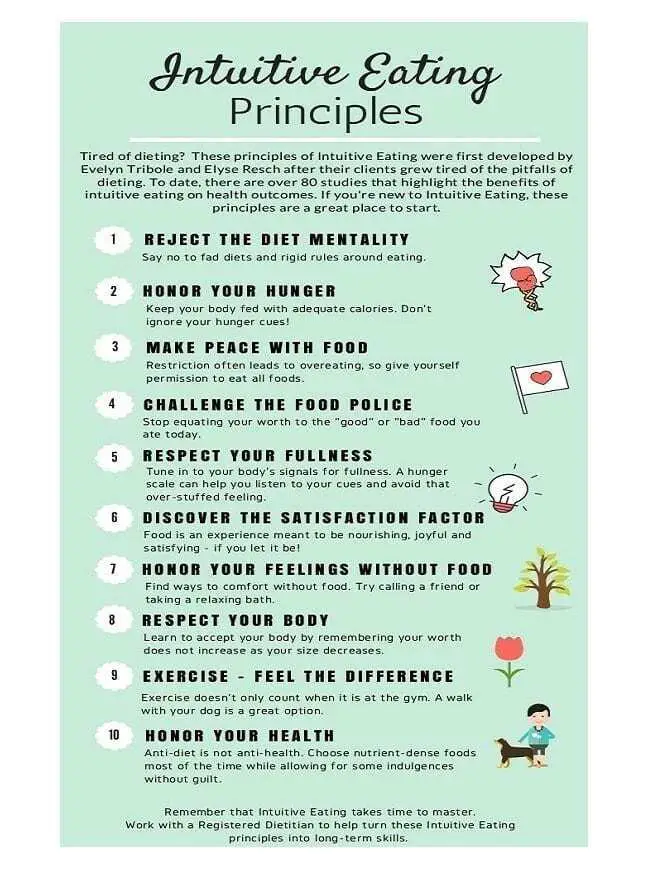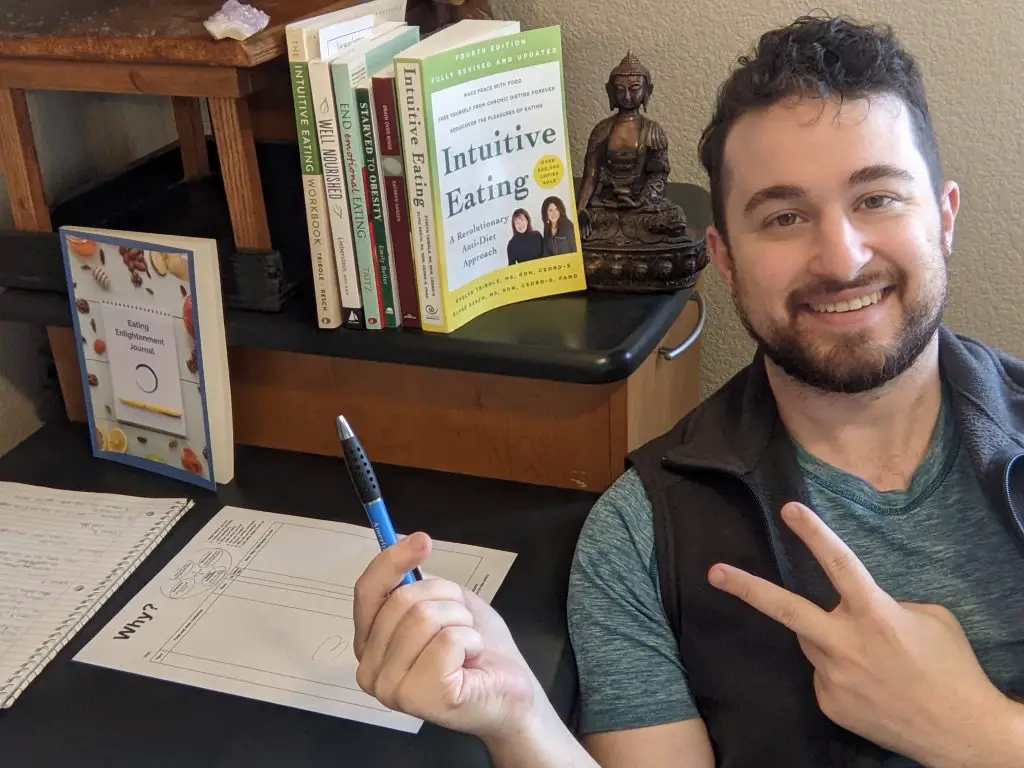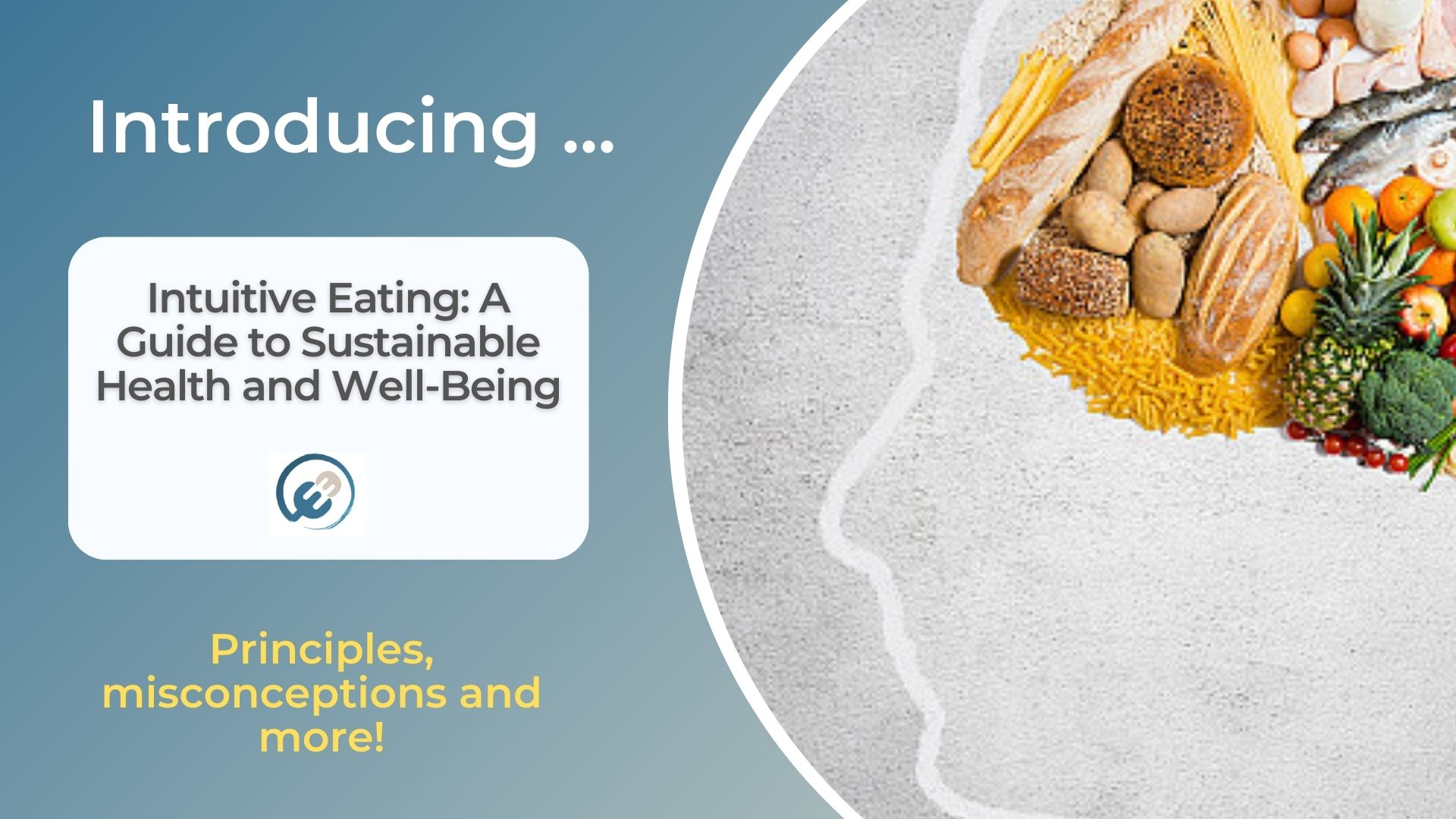We’ve all been there. You’re scrolling through Instagram, and you see yet another post about the latest fad diet.
- “Lose 10 pounds in just one week!”
- “Get bikini-ready in time for summer!”
It can be tempting to try out these diets, but more often than not they don’t work long-term and can even be harmful to your health.
So what’s the alternative? Intuitive eating!
Intuitive Eating is becoming a popular, mainstream approach to food that’s more sustainable than dieting.
In this article you’ll learn about the basic principles of Intuitive Eating, why dieting doesn’t work, and some resources where you can learn more.
What is Intuitive Eating in general?
Intuitive Eating is “a self-care eating framework which integrates instinct, emotion, and rational thought.”
In other words, it’s a way of making peace with food.
It’s about listening to your body and giving yourself permission to eat what you want, when you want it.
This might sound like a recipe for disaster, but those who practice Intuitive Eating actually end up eating less overall and are more in tune with their bodies’ natural cues.
Why doesn’t dieting work?

There are a few reasons why diets don’t work long-term.
First of all, they’re often based on the idea of deprivation.
You’re not supposed to have carbs or sugar or fat or whatever the latest “evil” food is.
But this approach often leads to cravings and eventually bingeing, which can leave you feeling even worse than before.
Secondly, diets are usually based on the idea of willpower.
You’re supposed to have the willpower to resist all those tempting foods.
The problem is that willpower is a limited resource, and it’s not sustainable in the long run.
Eventually you’ll give in to your cravings, and when you do you’ll feel guilty and like a failure.
Intuitive Eating is different because it’s based on the principle of permission rather than deprivation.
You’re allowed to eat whatever you want, whenever you want it.
Principles of Intuitive Eating

Here are a few principles of Intuitive Eating briefly described so you can better understand this alternative approach to eating management.
The 10 Intuitive Eating Principles Explained For Novices
Honoring your hunger
The first principle of Intuitive Eating is honoring your hunger. This means listening to your body and eating when you’re actually hungry, not just when it’s time to eat according to some arbitrary schedule.
You might be thinking “But I’m always hungry!” But chances are, you’re not really that hungry.
More often than not, we eat for reasons other than hunger: boredom, stress, anxiety, or even just because food is there.
If you can start to become more aware of why you’re eating, you can start to make better choices about what and how much to eat.
Unconditional eating
The second principle of Intuitive Eating is making peace with food. This means giving yourself permission to eat whatever you want, without guilt or shame.
For so many of us, food has become something to be afraid of. We think that if we eat the “wrong” thing, we’ll somehow screw up our diet and gain weight.
But the truth is, no food is really “bad.” Sure, some foods are more nutritious than others, and you certainly can overdo it with almost any food, but ultimately it’s up to you to decide what you want to eat.
And if you do happen to overeat or make a not-so-healthy choice, it’s not the end of the world! Just get back on track at your next meal.
Challenging the food police
The third principle of Intuitive Eating is challenging the food police. This means learning to quiet that critical voice in your head that tells you what you “should” and “shouldn’t” be eating.
For some of us, the food police are so loud that we can’t even hear our own hunger cues anymore.
But it’s important to remember that you are the only one who gets to decide what goes into your body. No one else knows what’s best for you!
Addressing Intuitive Eating Weight Loss Controversy
Common misconceptions about Intuitive Eating
Just like the misconceptions about vitamins and supplements, there are a lot of misconceptions about Intuitive Eating. Here are a few of the most common myths, debunked:
Intuitive Eating is just another fad diet:
False! Intuitive Eating is not a diet, it’s a way of eating. There are no rules or restrictions, and you don’t have to give up any foods.
Intuitive Eating is only for people who are already at a healthy weight:
False! Intuitive Eating can be helpful for people of all sizes. Whether you’re looking to lose weight, gain weight, or maintain your current weight, Intuitive Eating can help you achieve your goals.
Intuitive Eating is too hard, I could never do it:
False! Intuitive Eating is all about listening to your body and making peace with food. It might take some time to get used to, but it’s not hard. Anyone can do it!
How to get started
If you’re interested in giving Intuitive Eating a try, here are a few tips to get you started:
- Start by ditching the diet mentality. This means getting rid of any ideas about “good” and “bad” foods, and instead allowing yourself to eat whatever you want.
- Pay attention to your hunger cues. When you’re actually hungry, that’s when you should eat. Not before, not after, but when your body is telling you it’s time.
- Respect your fullness. Once you’ve eaten enough, stop. It’s okay to save food for later if you’re still hungry; don’t feel like you have to finish everything on your plate just because it’s there.
- Enjoy your food. This one is important! Make sure to savor your meals and enjoy the experience of eating. That way, you’re more likely to feel satisfied and be less likely to overeat.
- Listen to your body. Intuitive Eating is all about listening to what your body wants. If you’re not sure what that is, try keeping a food journal or talking to a registered dietitian or other healthcare professional.
How Intuitive Eating and Journaling Go Together

Most people are familiar with the idea of using a food journal to track what they eat. By writing down everything they eat and drink, they can get a better sense of their overall diet and make changes as needed.
However, food journals can also be used as a tool for intuitive eating. Intuitive eating is all about listening to your body’s hunger cues and honoring your cravings. It can be difficult to know when you’re truly hungry if you’re used to following a strict diet, but by keeping a food journal, you can start to get in touch with your body’s natural rhythms.
Every time you have a meal or snack, take a moment to write down how you’re feeling physically and emotionally.
Are you really hungry, or are you just bored? Did the food taste good, or did you just mindlessly munch on it? As you become more attuned to your body’s signals, you’ll find it easier to make intuitive choices about what to eat.
If you make a mistake, don’t beat yourself up about it. Everyone slips up sometimes, but it’s not a big deal.
Resources
If you’re interested in learning more about Intuitive Eating, I highly recommend checking out these resources:
- The Intuitive Eating Workbook by Evelyn Tribole and Elyse Resch
- Intuitive Eating by Rena Wing
- Body Respect by Linda Bacon and Lucy Aphramor
There are also a ton of great articles and blog posts about Intuitive Eating online. Just do a quick Google search and you’ll find tons of helpful information.
I hope this article has been helpful in giving you a basic understanding of Intuitive Eating! If you have any questions or would like to share your own experiences with Intuitive Eating, feel free to leave a comment below. Thanks for reading!


